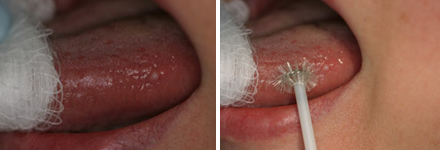Oral Cancer Screening
PATIENT REVIEWS
Fortunately, most oral sores or lesions are not harmful, but a small number are potentially dangerous if not identified early on. Oral cancer can be devastating if detected in its later stages. Therefore, we perform oral cancer screenings in New York City at our Manhattan office as a routine part of every patient’s check-up. Many suspicious lesions are removed by a painless brush biopsy technique and submitted to the laboratory for analysis. Brush biopsy does not require injections or any incision and are thereby, painless. It requires a mere 10 minutes for the test to be completed by Dr. Edalat. How does that sound for complete peace of mind?

Actor and producer Michael Douglas has donated his time to help create a television public service announcement (PSA) on behalf of the Oral Cancer Foundation (OCF), a non-profit organization dedicated to helping those affected by oral cancers. Listen what he has to say:
PATIENT EDUCATION VIDEOS
Dentline: Oral Cancer
What is an Oral Cancer Exam?
PATIENT EDUCATION VIDEOS
Oral Cancer Exam
Life saving measures
We perform a thorough oral cancer exam during your checkups because early detection can save your life. Oral cancer is the uncontrolled growth of abnormal cells in the mouth and throat. Some of the warning signs are—
- a red, white, or discolored patch or lump in or around your mouth.
- a sore that bleeds easily or that does not heal within 2 weeks.
- an area that has thickened, raised, or become hardened.
- a rough patch of tissue.
- difficulty chewing or swallowing.
- a chronic sore throat or hoarseness.
Oral cancer exam
During the exam, we feel for lumps or abnormal tissue changes on your neck and inside your mouth.
We thoroughly examine the soft tissues in your mouth, especially the most frequent oral cancer sites—
- your tongue.
- the floor of your mouth.
- your soft palate.
- your lips.
- your gums.
We may also do additional testing or use specialized equipment to identify any suspicious areas, particularly if you’re at higher risk, such as adults over 40, anyone who uses tobacco, especially those who also drink alcohol excessively, or people who have had oral contact with the human papilloma virus.
Lifestyle changes
Some lifestyle changes can minimize your chances of developing oral cancer. Our recommended changes include the following—
- Do not smoke or use smokeless tobacco.
- Avoid excessive use of alcohol.
- Eat plenty of fruits and vegetables each day.
With regular exams and a healthy lifestyle, you can better maintain your oral and overall health.
PATIENT REVIEWS
My husband and I both needed extensive dental work…and so, we actually flew to New York to see Dr. Edalat, after meeting one of his students who had raved about Dr. Edalat and his office. Both my husband and I feel and look so much better after our treatment. We wouldn’t dream of seeing any other dentist ever again!”
Louise C. – Kent, England

 Google
Google Yahoo
Yahoo Yelp
Yelp Insider Pages
Insider Pages Healthgrades
Healthgrades CitySearch
CitySearch Wellness
Wellness




